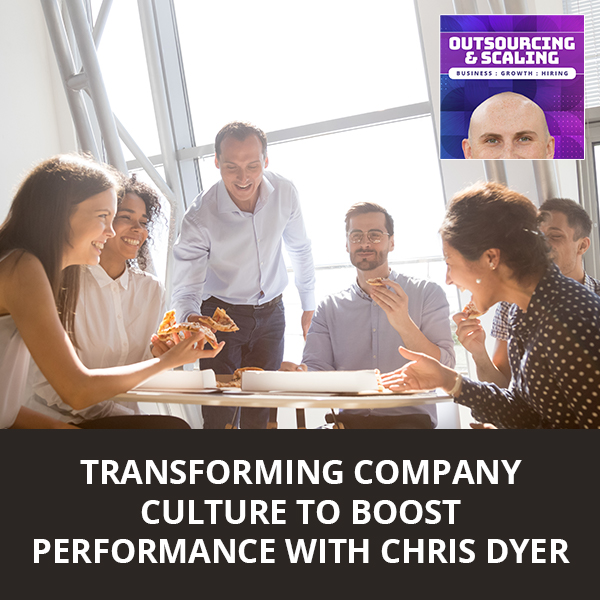


Culture is not very hard to break but it is very hard to build. On today’s episode, host Nathan Hirsch talks with performance expert Chris Dyer on transforming company cultures to boost their performance. Constantly intrigued by what makes some businesses and individuals more successful than others, Chris has dedicated years of research to uncovering what drives productivity and profits. Today, he talks about the importance of culture, working with remote teams and holding remote meetings, doing background checks on contractors.
—
Listen to the podcast here:
[smart_track_player url=”https://www.podetize.com/statsapi/www.podetize.com/wp-content/uploads/fileuploads/11-5b145ef137b51b3d1af0633e9305c43d/11/2019/8cbac991ae2f5aadcde871c764385590.mp3″ title=”Transforming Company Culture To Boost Performance With Chris Dyer” artist=”Nathan Hirsch” image=”https://freeup.net/wp-content/uploads/2019/04/OAS.png” ]
Download the audio file here.
Transforming Company Culture To Boost Performance With Chris Dyer
My guest is Chris Dyer. Chris, how are you doing?
I’m good. Thank you for having me.
I’m excited to talk to you. I know you do a lot with remote work, a lot with screening and a lot with culture. For those of you that don’t know, Chris is a recognized performance expert, consistently intrigued by what makes some businesses and individuals more successful than others. Chris has dedicated years of research on what drives productivity and profit. He’s a sought-out speaker and consultant working with leading organizations to help them transform their cultures and boost their performance. First, let’s take a gigantic step back. What was you like growing up as a kid? Were you a straight-A student? Were you a rebel? Did you always know you want to be an entrepreneur?
I always knew I wanted to be an entrepreneur. I also knew that I have way preferred adults because I love to learn things. I love to be able to talk to people that could tell me things, teach me things, and show me things that I didn’t know I was even interested in yet. I had my first lemonade stand at five. My best friend was the old guy next door. That’s the person I was. It wasn’t until the end of high school that I started tolerating people my own age. Kids want to screw around and they are mean to each other. I had my few friends that were kids, but I always preferred adults because they could teach me so much. I could learn from them. It’s fascinating to spend time with them. That entrepreneurial thing happened early, but then this idea of learning, I didn’t realize that it was going to be a lifelong thing. I was definitely not a straight-A student. I was barely a B-student. I did whatever I had to do to make my parents happy and the teachers happy so I could go learn other stuff that I was interested in.
What do they call that, an old soul? Someone that feels like they’re ahead of their time? What was your first entrepreneurial endeavor? What did that look like?

The first thing I ever did was a lemonade stand. I would get that and I’d make $20 and then I could go buy all the candy I wanted at the liquor store down the end of our street that I wasn’t allowed to go to, that I would sneak over to. Later on, it was the magazine sales. I don’t know if anyone remembers those in school. They would come and sell magazine subscriptions. That was a big thing and I had a competition. Every subscription you got, you got to spin a wheel, you got entries and toys. I still remember the model. It was this little robot that would go, “It’s not funny. You win money.” He would say how much money you won. It was a random thing, “You won $1. You won $100.” I always was the number one. I would win that almost every year selling magazine subscriptions and I would go door-to-door. In this day and age, parents would be outraged. They’d be afraid I’d be abducted. I would go to every house as far as I could go, knock on people’s doors, and get the nice old ladies to buy magazines for me.
What about down the line outside of school? Did you go to college? Did you graduate? What about after, did you have a real job or did you go right into entrepreneurship?
I went to college. I was spending a lot of time coaching throughout college. A lot of my jobs were related to sports. I was a swim coach, water polo coach, and soccer coach. The swimming thing took me into somewhat of an entrepreneurial thing. I became the head coach of a swimming team where my pay was based on how well the team was doing and how many kids we had swimming. I enjoyed it. The problem was, I started doing the math and realized it was a cap. Most money that I could make, even though it was good money for being a college student. It was $35,000 a year and I was like, “I’m not just going to keep living on that the rest of my life. It’s fine when it’s just me, but living in Southern California, that’s not going to cut it.”
I decided to take a job at a hotel. I became the director of security and later on, the director of operations. My degree was in criminal justice. They wanted someone who wasn’t an old cop. They took the young guy with a criminal justice degree who didn’t know anything about being a director of security at a hotel. I worked my way up to a director of operations and did that for a while. I then realized that I was driving two hours each way, which is too much. I love the experience of being in Hollywood. All these stars are around all the time. It was a cool venture, but it wasn’t a long-term thing.
I went back and worked for somebody else. I took the no-commute security predictable job and I thought that’s what I wanted. After a couple of years, I realized I was either going to have to go start my own thing or jump off a bridge because I couldn’t stand being this clock in, clock out guy. I’ve got rid of one problem and invented another. 2001 happened and 9/11 happened. I was watching live. It was that moment that I saw the second plane hit the tower. It was almost like a spell was lifted off of me. I was like, “This is not what I’m supposed to do. Life is too short. I’ve just witnessed this horrific thing. Why am I settling? Why don’t I go live my entrepreneurial dream or passion?” Two months later, I had started the company that I still have.
What was your first hire like? How did that look and how did that go?
Experience is expensive.
Early on, I relied on people that I knew and people that I had trust in. I knew what I could expect from them. I knew they would show up. I knew they wouldn’t be mad if I couldn’t make payroll, initially. You had a lot of family and friends and they would come and work for cheap. Early on, it was scraping together whatever I could do. After some time, I had to get past that. Hiring had to turn into bringing in more people who could help move the business forward that could bring a particular set of skill or passion to the company as opposed to just being a warm body who would show up. Some of those people that started with me early on in 2001 are still working for me. They have evolved and they have become these great people in the company. Other people were like, “They were here. The bus is full now. We had to bring on somebody else.”
What do you look for when you hire someone?
I look for passion and potential. There are jobs where experience can be helpful that they’ve done something with it. Experience is expensive. If you are an entrepreneur, sometimes, you’re better off bringing in a consultant basis and you’re better off bringing in as a part-time thing. Get somebody to come in and help you in a short period of time. You can’t afford a VP of sales who’s been working at your largest competitor for ten years. You’re starting up. It’s not going to work. You can hire someone like that to come in for a few hours a week or a few hours a month that will help you a little bit while you bring in somebody else that has the potential to turn into that person one day.
That’s what I look for. I have the added component because my company is 100% remote. They also have to be able to operate remotely. Not everyone can and not everyone understands that difference. They’ve got to manage their own time. They have to be autonomous. They have to also be highly communicative, be able to work in a team on a high-pressure situation and not need someone standing over them, either cubicle form, making sure they’re working.
Where does culture come into play there? I know you’re all about teaching businesses how to have that important culture. I know the culture, from my own experience, is something that’s not hard to break, but it’s hard to build. What do you look for in a person to make sure that they’re going to fit the culture of your business?
We do a lot to make sure that they understand what our culture is upfront. On their first day or within a couple of days of them starting, they meet with me and I do an entire hour-long presentation on what that looks like and what we do. Reminding them of all the things that we do. What we’re asking them to do is to opt-in or opt-out. “This is what we do. This is how we operate. This is who we are. If that sounds cool and if you’re excited when you hear that, that’s awesome.” If I tell you this stuff and you’re like, “I don’t know if I want to be transparent. I don’t know if I want to do these things,” You got to opt-out and we’re not the place for you.

It takes time. There were all those people that liked the idea of the job and that paycheck, but they don’t last. You can feel it when they can’t live the values that you’re talking about. Culture is the underlying fabric of how we make decisions. What are the norms? How do we operate? What do we do when things are good? What do we do when things are tough? Culture brings us that and if we’re not feeding that constantly, then it breaks down. It’s easy to break and it’s hard to build.
What are some of the red flags that you might see there during the interview process, maybe it’s their first week or how they interact with someone? What were some of the things that you see?
One of the big red flags I get early on is when someone’s coming in to be on a remote team, we go, “What brought you to us? Why did you decide to apply for the job?” They say, “Working from home sounds awesome.”
That is true. We do get that a lot. We get about 2,000 applicants a week to get on our platform. That’s a common thing. They don’t even know if they like working from home. They don’t care about the projects. They think it’s a cool new thing to do or they didn’t like sitting in the cubicle.
That’s a red flag. Sometimes, if you talk through that with people, it’s okay and sometimes, it’s not. It’s like, “Do you have a space to work?” They’re like, “Yes, I can work at this table in my side room.” We’re like, “That’s not going to work.” What does that look like inside of your environment? Walking them through that, have they ever done it? Have they ever tried it? Our people that we’d get that never have done it, but you can hear some of their answers. “When do you do your best work?” They’ll say things like, “If I can get some time away from everything, I could get my head down and focus. That’s when I get my best work done.” That’s a good potential for a remote contractor. They say, “I get my best work done when we have a meeting. I’m with everyone and we’re doing it all together.” That’s an important component of work sometimes, but not that much here for us. It’s more about, “Get your stuff done. Come meet with your team.” It’s constant back and forth.
You have these remote teams. You help other clients that work with their remote teams. What communication channels are you using? Are you doing daily meetings or weekly meetings? What does that look like? I feel like there’s a lot of people reading might be hiring remote for the first time. They’re used to having people in the office next to them that they can go tap on the shoulder. What is that communication?
Culture is that underlying fabric on how we make decisions.
Meetings are absolutely vital and key. Structuring them properly is key. I’ll walk you through some of the things we do for our meetings. Our basic communication setup is Slack. That’s our number one area that we use. That’s where we do a lot of our stuff. That’s where our teams communicate with each other when they’re not meeting and when they’re just passing information around. We try to keep emails down to an absolute minimum. The only reason to have an email is if you’re including someone from the outside. Internal communications all go through Slack. It’s trackable and it’s all there.
The problem with meetings is that when we ask people to show up, they don’t always know why they’re showing up and how they should show up. We’ve developed different meeting types. The first one is a cockroach meeting. You can imagine if you had a cockroach in the bathroom, it’s a small problem. Maybe you don’t want to clean it up, but it’s not that big of a deal. Anyone can call a cockroach meeting. It’s fifteen minutes long maximum. It’s optional for people to show up except for the person calling it. You’re just showing up to help someone solve a quick issue.
They’re like, “I don’t know if we integrate with this platform. Who can show up and tell me what they know about this thing?” What would happen in a remote environment as I would call you and have a discussion and hang up and call Tom and then hang up Jane or Susie, and then call you back and tell you what we all talked about? I have spent the entire day on the phone with one person at a time. It’s a complete waste, instead of giving everyone together for a quick meeting. We also always start on time. If you’re more than a minute late to a meeting, you have to sing a song. Everyone’s time from the CEO down to the brand-new person, your time is as valuable as anybody else’s. That is our goal, to always end early. There’s a thing called Manson’s law, which is, if you set aside a certain amount of time to get something done, it takes you that much time to get it done.
If you say, “I have two hours this Saturday to clean the garage.” You will take exactly two hours. You’ll putz around and do all these things for two hours. If you would have given yourself 30 minutes, you would have gotten most of it done in 30 minutes. It pushes and pulls based on the expectation. We try to hack that by saying, “We always end meetings early.” We don’t fill that meeting up with a bunch of crap that doesn’t need to happen. Our second meeting is a tiger team meeting. If there’s a tiger in your bathroom, it’s a much bigger problem. You better be prepared. You better come with a dart gun and a helicopter to get it out. Think of all the things you’d have to do to get a tiger out of your bathroom. It’s the same thing. You have a large issue in your organization. Managers tend to call those. They’re one to two hours. People come with research and they come prepared for a much more intense meeting. We’re going to work at something for quite a long time. This is a mandatory meeting. It’s a totally different focus than a cockroach meeting.
One that I call a lot is called an ostrich meeting which is like, “I don’t know the answer to something. Who can show up and tell me the answer? Who can explain it to me? I don’t know how to use a code in Excel. Can anyone show up at 1:00 and help me with basic coding in Excel?” Whatever they ask, those people who can have the bandwidth and the expertise will show up to do that. We have these different meetings. We have other ones like tsunami planning which is like a what-if situation. By creating those, it changes the focus for people. When we do our larger meetings, we do other things called designating the devil, which is we designate people to argue and to say the opposite even if they believe the truth. We want an argument. We want devil’s advocates in there. When you assign people to be devil’s advocates, everyone else starts being a devil’s advocate, you poke the right holes into an idea and leave there with what should be the actionable thing to do.
You do a lot with background checks. It’s not something that we do with FreeeUp. We’re dealing with freelancers and contractors. With agencies, it’s a little bit different. What is the purpose of a background check? What do you guys do with that? What do you consult your clients about?

Our core business is background checks and employment screening. We help companies and we help landlords. For a lot of companies, they’re just being asked or they’re being mandated to do it from a regulatory standpoint. For some companies, it’s a big issue. If you’re going to be placing someone, a freelancer or whoever, maybe they’re going to go do something at a daycare out of school. You had to better make sure they’re not a sex offender or have abused children. Your reputation is on the line if that person does something, not to mention the potential liability you may have. For a typical contractor as well, you don’t want to put people in charge of handling money if they’ve had a history of stealing. They are basic things. You don’t want to send someone out to go do deliveries if they have an expired driver’s license or three accidents. There are people who don’t belong in the job that they’re asking to do because they’ve had problems. Make sure that they fit that mold. For me, background checks are not about like, “You have a criminal record. You can’t work here.” It’s about, “Do this person’s résumé, interviews, and background come together? Does it work for this job? Can it be there?”
Usually, the obvious ones that are obviously known happen quickly. You can see it. “You have three DUIs. You have a suspended license. You should not be driving for us.” This is obvious. Those are the harder ones. People had some issues in their past, maybe you can look and they’ve been doing well. You’re willing to give them a shot and put them in there. It’s about understanding who that person is completely so you can make good decisions and you can also put in good safety nets if you feel like this person is someone you need to keep an eye a little bit longer. Make sure they’re doing a good job for us.
Chris, this had been awesome. Where can people find out more about you? What are you most excited about for the rest of the year?
You can go to my website, ChrisPDyer.com. We do free webinars and I speak all around the world. PeopleG2.com is for the background checks. If you’re interested in going there, you can find me on LinkedIn or Twitter. What am I most excited about? The book I wrote back in 2018, The Power of Company Culture, has opened many doors that I never thought would be open and that I never thought would happen. I have travel speaking at many conferences around the world. I’m super excited. I get to go to South Africa and Croatia. I’m excited about going to these new places, getting introduced to new cultures and being able to deliver the message of great culture to them.
Thank you for coming on.
Thank you.
Important Links:
- FreeeUp
- ChrisPDyer.com
- PeopleG2.com
- LinkedIn – Chris Dyer
- Twitter – Chris Dyer
- The Power of Company Culture
About Chris Dyer
 Chris Dyer is a recognized performance expert. As a sought-after speaker and consultant, Chris works with leading organizations to help them transform their cultures to boost performance. and gain an even greater edge in the marketplace. A certified SCRUM Master, Chris highly adept at helping teams work through obstacles and find solutions quickly and effectively. He leverages this experience in all aspects of his work.
Chris Dyer is a recognized performance expert. As a sought-after speaker and consultant, Chris works with leading organizations to help them transform their cultures to boost performance. and gain an even greater edge in the marketplace. A certified SCRUM Master, Chris highly adept at helping teams work through obstacles and find solutions quickly and effectively. He leverages this experience in all aspects of his work.
Chris is the author of The Power of Company Culture, which was released in 2018. He is also the Founder and CEO of PeopleG2, a background check company that has appeared on the Inc. 5000 list of the Fastest Growing Companies.
A passionate talent management enthusiast, Chris is the host of TalentTalk, a popular business podcast that features interviews with top executives about their strategies for hiring and promoting talent. Chris strongly believes in community involvement, and he is active with a number of organizations. He regularly serves as a judge at entrepreneurial showcases and contests, such as Miller Lite Tap the Future. Additionally, he runs two book clubs for Senior Level and HR Professionals in Southern California. Chris also serves on the board of Working Wardrobes, a non-profit organization that empowers people who are overcoming difficult challenges, such as abuse or homelessness, to confidently enter the workforce and achieve self-sufficiency.
In his free time, Chris enjoys traveling with his wife and kids, and playing live music with his band. He resides in Orange County, California.
